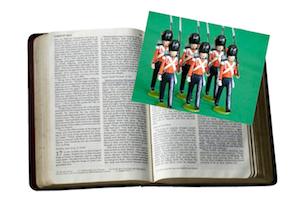 So what do we do with the positive examples of soldiers in the New Testament? Doesn’t the existence of men like Cornelius mean that soldiering is not inherently sinful? To the dismay of hardline pacifists everywhere, I’d say yes. It does show that soldiers can be pleasing to God.
So what do we do with the positive examples of soldiers in the New Testament? Doesn’t the existence of men like Cornelius mean that soldiering is not inherently sinful? To the dismay of hardline pacifists everywhere, I’d say yes. It does show that soldiers can be pleasing to God.
Just to try and anger everyone, let me point out that the text doesn’t tell us whether Christians becoming soldiers is pleasing to God. Since we don’t see that in the New Testament, we can’t argue either way from these examples. Did these men continue soldiering after becoming Christian? Did they limit their participation in any way? Those questions go unanswered.
But I find the soldiers in Luke 3 fascinating. Who are these guys? It’s extremely unlikely that these were Jews who had joined the Roman army. They might be Romans who had become Jews, though it’s more likely they were god-fearers at best. Still, it’s an incredible sight to see these representatives of Rome coming to a crazy Jewish prophet for spiritual guidance.
And the guidance John gives reminds us that, at that moment any way, these soldiers were performing police duties, rather than fighting on the front lines. But he doesn’t say “Resign,” nor does he rebuke them for their position.
The centurion with great faith (Matthew 8) is another important character. He gets nothing but praise from Jesus. No “Go and sin no more.” No “Sell all your weapons and give the money to the poor.” Nothing but “Go! It will be done just as you believed it would.”
Cornelius was a man pleasing to God. His example upsets the theology of many, especially with the text’s emphasis on the role of Cornelius’ good works in his being chosen by God. Good works done while serving as a Roman officer.
Some thoughts on these examples:
- Like it or not, in each instance we see men who are serving in a role that today would be a police force. I know that doesn’t set well with those who want to argue that Christians can never bear arms nor with those who want to use these men to argue for Christians serving in the military.
- Contrary to what you may have heard, however, the early church was not completely pacifistic. In reviewing a book called Defending Constantine, Ben Witherington refutes that idea rather thoroughly:
- Both Tertulian and Eusebius relate a story of Christians in Marcus Aurelius’ army who prayed for water for the troops
- Historians can point to solid evidence that there were Christians in the armies in North Africa and the eastern and western fronts
- When Constantine had his vision of the cross, he sought out Christians among his troops to help him interpret the sign
- As I’ve written about before, Hippolytus gives us insight into how some Christians dealt with military service: soldiers who were converted didn’t have to quit, but they were limited in what they could rightfully do. And Christians were not allowed to join.
While the examples of soldiers in the New Testament doesn’t settle any issues, it does remind us that pacifists need to be careful not to overstate their case.


